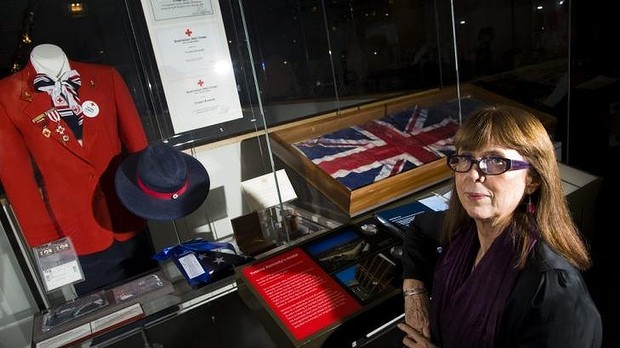By Megan Gorrey The Canberra Times

National Museum of Australia curatorial fellow Carol Cooper with a display that honours Australian Red Cross volunteer Yvonne Kennedy, who died in the September 11, 2001, terrorist attacks. Photo: Elesa Kurtz
It was a day that saw one of her young sons accidentally suspended by his shirt collar from a tree branch, while her other son knocked back half a bottle of furniture polish. It prompted Yvonne Kennedy to join the Australian Red Cross.
As a widower raising two mischievous boys, Mrs Kennedy figured first-aid training was sure to come in handy.
That training led to a distinguished 25-year career with the organisation. Mrs Kennedy died in the September 11, 2001, terrorist attacks, but her devotion to helping others is still celebrated.
The National Museum of Australia and the Australian Red Cross will honour the life and contribution of Mrs Kennedy to mark World Red Cross Day on Thursday.
Mrs Kennedy, one of 10 Australians killed in the attacks, was on board hijacked American Airlines flight 77 when it crashed into the Pentagon. She was at the end of a trip taken to celebrate her retirement.
Her family donated personal items for a display at the museum, which includes a Red Cross jacket, her pins and badges, and the Distinguished Service Medal she was awarded shortly before she died.
It also features Mrs Kennedy’s keys and wallet, which were recovered from the crash debris, sympathy cards, an Australian flag and a White House condolence card.
Her son Simon Kennedy, a comedian and voice-over artist, said the terrorist attacks were tragic, but the display showed what a wonderful woman his mother was.
It was also an opportunity to “shine a light on a fantastic organisation”.
“I know that the nature of mum’s passing is probably responsible for bringing more light to her story,” Mr Kennedy said.
“But it also sheds light on her as a person, and the life she lived.
“We had very good reason to be proud of her.”
He said his mother was a selfless, giving person who started first-aid training with the Red Cross “because my brother and I were young boys who made her very nervous”.
Mr Kennedy wrote about the aftermath of his mother’s death in a book 9/11 and the Art of Happiness, published earlier this year.
National Museum curatorial fellow Carol Cooper said the display was a celebration of the way Mrs Kennedy lived, rather than a reminder of the way she died.
“She was an ordinary person, who was really an extraordinary person; as a mother but also as someone who was passionately involved with the Red Cross.”
Red Cross chief executive Robert Tickner said Mrs Kennedy embodied the organisation’s commitment to improving the lives of vulnerable people.
“It is touching that her life is being commemorated in this way at the National Museum, during Australian Red Cross’ centenary year,” he said.

